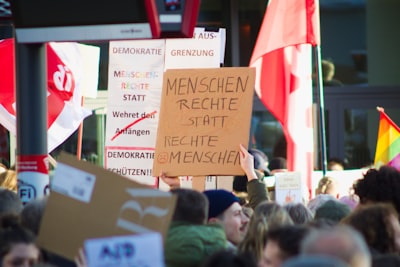Understanding 'Wehrhafte Demokratie': The Resilient Democracy in Germany
As far-right ideologies and parties like the Alternative für Deutschland (AfD) continue to gain traction, the principle of "Wehrhafte Demokratie"—or 'militant democracy'—has reemerged as a central theme in German politics. At a recent SPD party congress, delegates urged the government to prepare for a possible procedure to ban the AfD.
This move has sparked debate across the country and raised essential questions: What is a party ban in Germany? What does 'Wehrhafte Demokratie' mean in practice? And could banning the AfD actually strengthen democracy, or backfire? Let's dive into the current debate, legal frameworks, and broader trends.
What Does 'Wehrhafte Demokratie' Stand For?
'Wehrhafte Demokratie' refers to the principle that a democracy must actively defend itself against forces that threaten its existence—even if that means restricting certain freedoms for anti-constitutional actors. Enshrined in Germany's Basic Law (Grundgesetz), this principle was born from the historical lessons of the Weimar Republic, where unchecked extremists undermined democracy from within.
The Legal Path: How Does a Party Ban Work in Germany?
Germany has special mechanisms for banning anti-democratic parties:
- Constitutional Court Decision: Only the Federal Constitutional Court can ban a party.
- Strict Requirements: A party must be proven to actively fight against the free democratic basic order.
- Historic Precedents: Only two parties (SRP, KPD) have been banned since WWII, and previous attempts (like the NPD ban) set a high bar for evidence and justification.
The AfD Ban Debate: Arguments For and Against
With the AfD regularly polling in double digits and some party members facing accusations of extremism, many Germans worry about the erosion of democratic norms. The SPD and other parties argue a ban is necessary to protect democracy, while others warn of the risks:
Arguments for a Ban:
- Protecting minorities and democratic institutions.
- Setting a clear line against extremist rhetoric.
- Upholding Germany’s historical responsibility.
Arguments against a Ban:
- Risk of martyring the AfD and fueling anti-establishment sentiment.
- Difficulties in meeting strict legal criteria.
- Potential to push extremist views underground rather than eliminating them.
Public Opinion and Emerging Trends
Recent polls show a divided German public on the idea of banning the AfD, reflecting broader European debates about how to handle far-right parties. Meanwhile, social media and youth movements are rallying both in support and opposition, indicating that the discussion is not limited to parliament alone.
International Perspectives: How Do Other Democracies Respond?
Germany’s 'Wehrhafte Demokratie' approach is rare. Few Western democracies have such explicit legal tools for banning parties. Most countries rely on political isolation, education, and enforcement of existing hate speech or incitement laws.
Conclusion: What’s Next for 'Wehrhafte Demokratie' and German Politics?
The SPD's call to prepare for a potential AfD ban spotlights the enduring tension between freedom and security in democratic societies. As Germany navigates this complex debate, the world watches to see if 'Wehrhafte Demokratie' can inspire resilient, inclusive democracies elsewhere—or if new approaches are needed in the digital age.
FAQ
Q: What is 'Wehrhafte Demokratie'?
A: It’s the idea that democracies must proactively defend themselves against threats, even if it means limiting certain freedoms of anti-democratic actors.
Q: Has Germany banned parties before?
A: Yes, but only rarely and with strict legal procedures. The SRP (1952) and KPD (1956) were banned; a ban on the NPD failed in 2017.
Q: What’s the risk of banning the AfD?
A: Critics say it could make the party stronger by making them appear as victims, and might not address the roots of far-right support.
For further reading, visit Bundeszentrale für politische Bildung or the German Constitutional Court.

Comments
No comments yet. Be the first to comment!